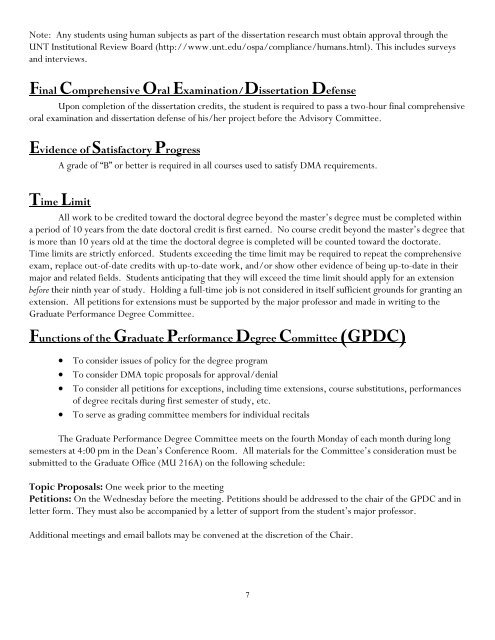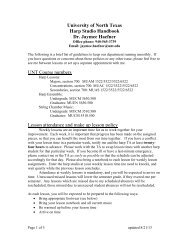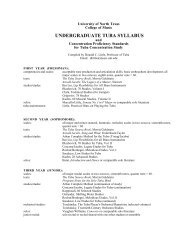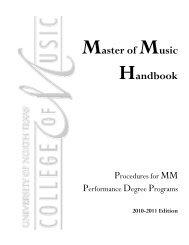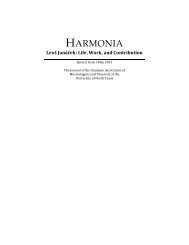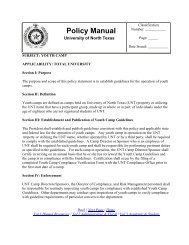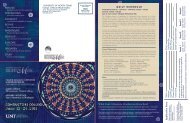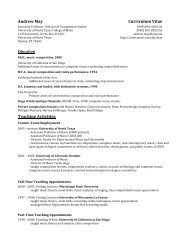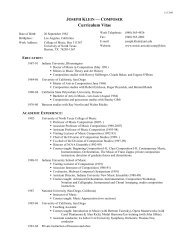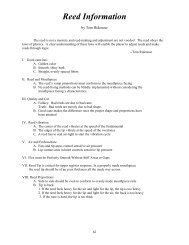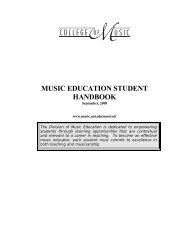Doctor of Musical Arts In Performance Handbook - UNT College of ...
Doctor of Musical Arts In Performance Handbook - UNT College of ...
Doctor of Musical Arts In Performance Handbook - UNT College of ...
Create successful ePaper yourself
Turn your PDF publications into a flip-book with our unique Google optimized e-Paper software.
Note: Any students using human subjects as part <strong>of</strong> the dissertation research must obtain approval through the<br />
<strong>UNT</strong> <strong>In</strong>stitutional Review Board (http://www.unt.edu/ospa/compliance/humans.html). This includes surveys<br />
and interviews.<br />
Final Comprehensive Oral Examination/Dissertation Defense<br />
Upon completion <strong>of</strong> the dissertation credits, the student is required to pass a two-hour final comprehensive<br />
oral examination and dissertation defense <strong>of</strong> his/her project before the Advisory Committee.<br />
Evidence <strong>of</strong> Satisfactory Progress<br />
A grade <strong>of</strong> “B” or better is required in all courses used to satisfy DMA requirements.<br />
Time Limit<br />
All work to be credited toward the doctoral degree beyond the master’s degree must be completed within<br />
a period <strong>of</strong> 10 years from the date doctoral credit is first earned. No course credit beyond the master’s degree that<br />
is more than 10 years old at the time the doctoral degree is completed will be counted toward the doctorate.<br />
Time limits are strictly enforced. Students exceeding the time limit may be required to repeat the comprehensive<br />
exam, replace out-<strong>of</strong>-date credits with up-to-date work, and/or show other evidence <strong>of</strong> being up-to-date in their<br />
major and related fields. Students anticipating that they will exceed the time limit should apply for an extension<br />
before their ninth year <strong>of</strong> study. Holding a full-time job is not considered in itself sufficient grounds for granting an<br />
extension. All petitions for extensions must be supported by the major pr<strong>of</strong>essor and made in writing to the<br />
Graduate <strong>Performance</strong> Degree Committee.<br />
Functions <strong>of</strong> the Graduate <strong>Performance</strong> Degree Committee (GPDC)<br />
• To consider issues <strong>of</strong> policy for the degree program<br />
• To consider DMA topic proposals for approval/denial<br />
• To consider all petitions for exceptions, including time extensions, course substitutions, performances<br />
<strong>of</strong> degree recitals during first semester <strong>of</strong> study, etc.<br />
• To serve as grading committee members for individual recitals<br />
The Graduate <strong>Performance</strong> Degree Committee meets on the fourth Monday <strong>of</strong> each month during long<br />
semesters at 4:00 pm in the Dean’s Conference Room. All materials for the Committee’s consideration must be<br />
submitted to the Graduate Office (MU 216A) on the following schedule:<br />
Topic Proposals: One week prior to the meeting<br />
Petitions: On the Wednesday before the meeting. Petitions should be addressed to the chair <strong>of</strong> the GPDC and in<br />
letter form. They must also be accompanied by a letter <strong>of</strong> support from the student’s major pr<strong>of</strong>essor.<br />
Additional meetings and email ballots may be convened at the discretion <strong>of</strong> the Chair.<br />
7


